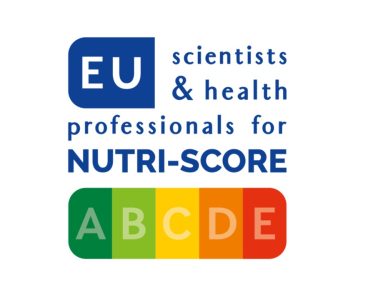Press release, 11 May 2023, EU scientists and health professionals for Nutri-Score
A group of 316 scientists and health professionals released a comprehensive scientific report explaining “Why the European Commission must choose the Nutri-Score nutrition label – a public health tool based on rigorous scientific evidence – as the harmonized mandatory nutrition label for Europe”.
The European Commission has committed, as part of its “From Farm to Fork” strategy, to propose a mandatory EU-wide harmonized front-of-pack nutrition labelling scheme applicable throughout the EU by 2023. However, strong lobbying groups are heavily mobilized to prevent the EU-wide introduction of the Nutri-Score, or to delay its adoption, or to choose a useless alternative.
This opposition stems from the joint pressure of large food companies opposed to Nutri-Score, including Ferrero, Lactalis, Coca-Cola, Mars, Mondelez, Kraft, of certain agricultural sectors, not least the cheese and processed meat sectors and their powerful European representation COPA-COGECA. They are joined by various political parties and politicians close to the lobbies, and the lobbying actions of the Italian government (accelerated since the last Italian elections). Their widespread lobbying and their public use of even the most absurd and dishonest arguments as well as fake news seems to have led the European Commission to pause its efforts to regulate front-of-pack nutrition labelling.

Despite strong and conclusive scientific and societal arguments in favour of the Nutri-Score, recent statements of some Commission officials hinted that the Commission might not retain Nutri-Score because it would be too “polarizing”. There is no scientific or public health argument for this position, but a spurious argument instead: Nutri-Score would not be acceptable because it would be opposed by some economic and political lobbying groups. The Commission has invoked a “complex” situation, whilst we know that its hesitation stems from Italy’s violent opposition, which defends the commercial interests of some of its agri-food industry sectors. They have proposed their own non-interpretive label, Nutrinform, which is very similar to the industrial GDA/RI model launched in the 2000s, whose inefficiency to guide consumer choices has been well established by numerous studies. The Commission is holding a worrying discourse, ignoring current scientific evidence regarding front-of-pack nutrition labels in the EU context and the clear advantages in having one harmonized front-of-pack nutrition labelling scheme throughout the European Union that works for consumers.
Considering the risk of postponing the adoption of a mandatory front-of-pack nutrition label at European Union level or the adoption of a nutrition label not based on scientific evidence, 316 scientists and health professionals working in the fields of nutrition, obesity, public health, preventive medicine, endocrinology, oncology, cardiology, paediatrics, psychology, European law and social marketing, gathered in the “Group of European scientists and health professionals supporting Nutri-Score”, have mobilized to make their voices better heard in the current debate.
To this effect, they are publishing today a scientific report of 61 pages with 105 references: “Why the European Commission must choose the Nutri-Score nutrition label – a public health tool based on rigorous scientific evidence – as the harmonized mandatory nutrition label for Europe” highlighting very strong arguments in favour of choosing the Nutri-Score:
- The numerous scientific studies performed over many years in some 20 countries validate the algorithm underlying the Nutri-Score calculation (including cohort studies involving more than 500,000 subjects with long-term follow-up) and its effectiveness to help consumers make healthier
food choices, including studies in virtual supermarkets, experimental stores and real supermarkets. More than a hundred studies have been published since 2014 in international peer-reviewed journals demonstrating its effectiveness, particularly in disadvantaged populations, and its superiority compared to other labels. - The recent update of the Nutri-Score by a scientific committee composed of independent European experts will apply in 2023. This will address certain identified limits of the Nutri-Score and therefore allow a better alignment of the Nutri-Score with public health nutritional recommendations.
- The conclusions of the report of the European Joint Research Centre published in September 2022, highlight that consumers, including those with lower incomes, prefer simple, colourful and evaluative summary front-of-pack labels (such as Nutri-Score), which are more easily understood than more complex, non-evaluative, monochrome labels (such as Nutrinform).
- The results of the public consultation launched by the European Commission that ran between December 2021 and March 2022 showed that the majority of consumer organizations and other NGOs, citizens, research and educational institutions and public authorities alike support a label providing gradual information on overall nutritional quality of foods (which corresponds totally to the characteristics of the Nutri-Score).
- The support it has received from many European scientific associations, not least the European Public Health Association (EUPHA), the European Childhood Obesity Group (ECOG), the European Heart Network (EHN), the European Academy of Paediatrics, United European Gastroenterology; consumer associations, including the BEUC composed of 46 independent consumer organisations from 32 European countries) and NGOs such FoodWatch present in different European countries.
- Its formal adoption and implementation in 7 European countries to date (France, Belgium, Germany, Spain, The Netherlands, Luxemburg, Switzerland), which demonstrates the feasibility of its deployment, the fact that it has received strong support from and is extensively used by consumers and has favourable effects on sales of food items in stores.
The scientific report also addresses questions that may be legitimately raised on Nutri-Score but that are often misused and exploited as fake news by lobbying groups:
- why it does not take into account ultra-processing;
- why it is calculated per 100 g / 100 ml;
- why it does not include all food nutrients/components that might be of interest to consumers;
- why it is not a substitute for general nutritional public health recommendations;
- why it does not amount to an attack on traditional foods and does not penalize good products with PDO and PGI labels;
- why Nutri-Score is not a threat to the Mediterranean diet;
- why Nutrinform battery system is not a legitimate alternative to Nutri-Score in Europe.
This comprehensive scientific report and the mobilization of the European scientists and health professionals aim to remind European public authorities of the necessity to put science and public health at the forefront of the decision and protect them from the influence from private economic interests! It is why they urge the Commission to propose legislation to adopt an EU-wide mandatory interpretive front-of-pack nutrition label based on science, as Nutri-Score is. Its adoption in Europe could promote healthier food environments and help consumers lower their risk of developing non-communicable diseases, and particularly nutrition-related chronic pathologies, such as obesity, cardiovascular diseases, diabetes, hypertension, cancers, which represent a major burden on health systems throughout the EU.
It is clear that the implementation of a front-of-pack nutrition label such as Nutri-Score on a mandatory basis and on all foods will not, alone, solve all nutrition-related problems: it can only be a contributor (as has been scientifically demonstrated) to improved nutritional outcomes and population health. Even if Nutri-Score is based on solid scientific evidence, it remains one element only of an effective public health nutrition policy, but it is an important tool to help consumers make healthier food choices at the point of purchase and therefore create a healthier food environment.
To download:
– the scientific report: https://nutriscore-europe.com/wp-content/uploads/2023/01/NS_rapport-EU-V10_230202.pdf
– the list of the EU scientists and health professionals endorsing it (and the international committee supporting this initiative gathering experts from USA, Brazil, Australia, New Zealand, Japan, China…) : https://nutriscore-europe.com/members/
Contacts for more information (alphabetic order):
– Dr Torsten BOHN: Dept of Department of Precision Health, Luxembourg Institute of Health (Luxembourg)
Torsten.Bohn@lih.lu
– Prof Amandine GARDE: Director of the Law & Non-Communicable Diseases Research Unit Unit, School of Law
and Social Justice, University of Liverpool (UK) agarde@liverpool.ac.uk
– Prof Serge HERCBERG : Emeritus Professor of Nutrition, Sorbonne Paris North University (France)
hercberg@eren.smbh.univ-paris13.fr
– Prof Berthold KOLETZKO: Else Kröner-Senior Professor of Paediatrics LMU – Ludwig Maximilians Universität
Munich (Germany) Berthold.Koletzko@med.uni-muenchen.de
– Prof Igor PRAVST: Nutrition Institute, Ljubljana, (Slovenia) igor.pravst@nutris.org
– Prof Mike RAYNER: Professor of Population Health, Nuffield Department of Population Health University of
Oxford (UK) mike.rayner@ndph.ox.ac.uk
– Prof Jordi SALAS-SALVADO : Universitat Rovira i Virgili, Departament de Bioquímica i Biotecnologia, Unitat de
Nutrició Humana. Reus, Spain. (Spain) jordi.salas@urv.cat
– Prof Sylvain SEBERT : Professor of Life-course Epidemiology, Unit of population Health, University of Oulu
(Finland) Sylvain.Sebert@oulu.fi
– Dr Mathilde TOUVIER: Director of the Nutritional Epidemiology Research Team (EREN) (France)
m.touvier@eren.smbh.univ-paris13.fr
– Dr Stéphanie VANDEVIDJERE: Public health nutrition/Epidemiology and public health, Sciensano, Brussels
(Belgium) Stefanie.Vandevijvere@sciensano.be

